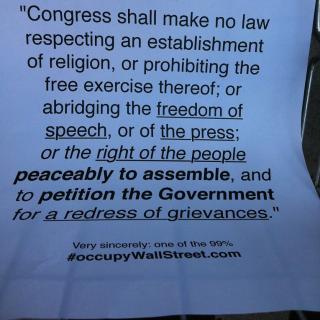Advertisement
Over 50 years ago, the TV documentary Harvest of Shame brought a national spotlight on the town of Immokalee, Florida and the exploitation of migrant farm laborers across the U.S. In the years that followed, the work of Cesar Chávez and the United Farm Workers brought some incremental improvements, but agricultural laborers have still been “exempted” from most of the protections in the Fair Labor Standards Act.
In the past five years, the lives of Florida farmworkers and their families have taken a dramatic turn for the better, thanks to the Fair Food Program, an organizing strategy developed by the Coalition of Immokalee Workers (CIW), a group of Florida farmworkers who have been fighting for human rights in the tomato industry since 1993.
So far 14 large U.S. food retailers, including Chipotle and Trader Joe’s, have signed an agreement with the CIW to pay a penny-per-pound premium for tomatoes harvested in Florida, to be passed on to the workers by their employers. They also agree to buy tomatoes only from growers who adhere to a code of conduct that includes safe working conditions and zero tolerance for slave labor and sexual harassment.
During the Wendy's annual shareholder meeting on May 26, faith groups and students from across the Midwest joined the CIW in a protest outside the company's corporate headquarters in Dublin, Ohio. Of the five largest U.S. fast food corporations, only Wendy’s has refused to join the Fair Food Program.
“Wendy’s cannot continue to extract profit from the poverty and exploitation of farmworkers,” said CIW member Lupe Gonzalo. “We will not stand for that. We are here today to let Wendy’s know that they are not going to be able to continue making billions of dollars off the backs of poor people.”
After years of protests, store visits, petitions, and letter-writing campaigns, Wendy’s still has not budged. So the CIW stepped up the pressure in March by calling for a nationwide boycott against the fast-food chain.
“Wendy’s has a simple decision to make today,” Gonzalo said. “Will they join the Fair Food Program, or will they continue to feel the boycott growing day by day outside their stores and around the country?”
The Fair Food Program took many years to incubate. It was conceived in 2001, after the CIW had spent some years pressuring Florida growers for wage increases with only very modest success. The workers did a close analysis of the economic forces that were keeping their wages stagnant. They discovered that their main obstacle is not their employers, the growers. The main obstacle is the large food corporations who buy tomatoes and other fresh produce from the growers. The “food chain” works like this:
- Large food retailers — grocery and fast food chains — purchase from growers in vast quantities. This gives them power to dictate to the growers how much they will pay for fresh fruit and vegetables. The retailers are corporations whose primary goal is to maximize profits to further enrich themselves and their shareholders. Keeping their costs low keeps profits high.
- The growers are between a rock and a hard place. They’re not getting rich. The economic pressure from the retailers leaves them with very little left over to pass on to their workers. Raising workers’ wages past a certain point would put them out of business.
- At the bottom of the food chain are the workers who bring in the harvest. Their wages were stagnant for decades until the Fair Food Program was implemented five years ago.
The Fair Food Program starts at the top of the food chain by appealing to conscientious consumers who want fruits and vegetables that are produced without violating the human rights of workers. Most of the corporations that have signed with the CIW have done it because of pressure from their customers to do the right thing.
As the protesters marched outside, CIW member Silvia Perez walked into the shareholder meeting to speak with Wendy’s board and shareholders. She was joined by Rabbi Rachel Kahn-Troster of the human rights organization T’ruah and Amanda Ferguson of the Student/Farmworker Alliance.
“The person who responded to me from the board of directors said that farmworkers are not Wendy’s employees,” Perez said. “He said that they don’t have the responsibility to pay the employees of other companies; it’s the responsibility of their suppliers.”
This “qualm” reflects either real or pretended ignorance of how the Fair Food Program actually works. “No corporate buyer pays a farmworker directly,” Laura Safer Espinoza told the Orlando Sentinel. “They pay the sellers, and that premium gets passed down the supply chain to the workers.” Espinoza is a former New York State Supreme Court Judge and currently the executive director of the Fair Food Standards Council, which independently monitors working conditions in the fields and investigates workers’ complaints.
In response to pressure from the CIW, Wendy’s recently moved its purchasing from Florida “to Mexico, where workers are facing serious human rights abuses,” Perez said. Wendy’s has been buying tomatoes from the Mexican grower Bioparques de Occidente, which was the subject of a major slavery prosecution in 2013.
“Many, many workers were enslaved,” Perez said. “There was child labor going on, and sexual harassment of women. That is the kind of supplier that Wendy’s has chosen instead of buying in Florida and committing to the Fair Food Program, where workers’ rights are respected.”
Tens of thousands of individuals have joined the national boycott of Wendy’s, Perez said. More than 12 faith organizations have also endorsed the boycott, including the Presbyterian Church, the United Church of Christ, T’ruah: the Rabbinic Call for Human Rights, the Unitarian Universalist Association, the Christian Church (Disciples of Christ), and several Catholic groups (e.g., Communion of Synodal Catholic Churches, Catholic Rural Life, various orders of nuns — full list here). Collectively these organizations represent many millions of followers.
Wendy’s board of directors and shareholders need to understand the tenacity of the Immokalee Workers and their allies, and the long view they take of the struggle. Equivocation won’t stop them. Subterfuge won’t stop them. Arrogance won’t stop them. The boycott will continue to grow until the impact on Wendy’s bottom line will be impossible to ignore.
Click here to join the Wendy's boycott.





